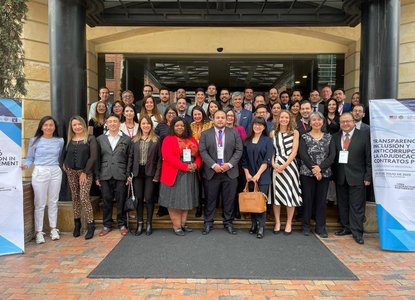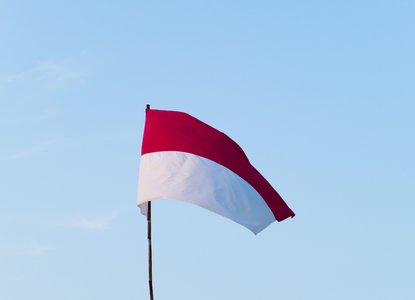Connecting data on beneficial ownership, public contracting and politically exposed persons: reflections from a regional anti-corruption workshop
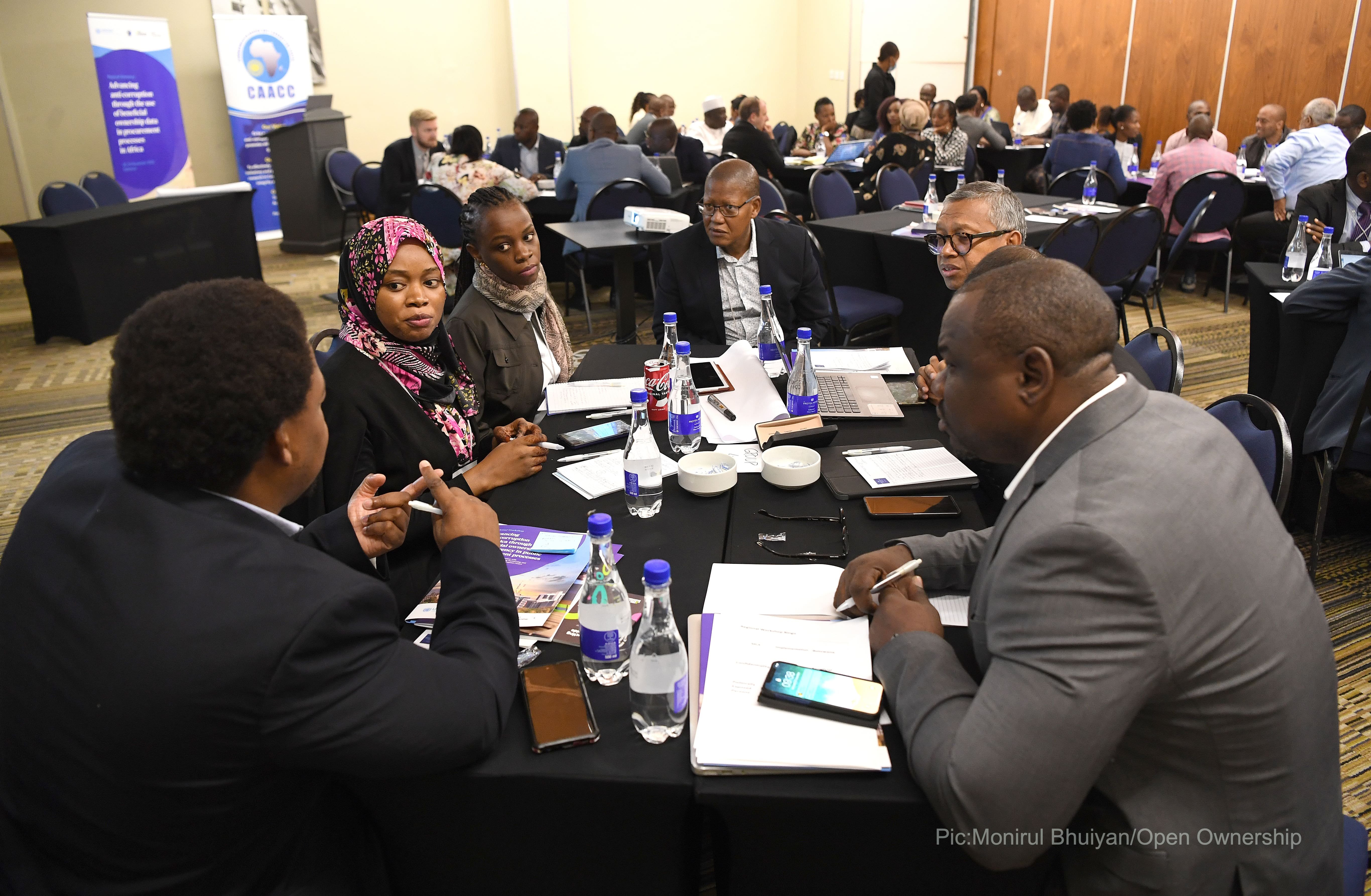
Group discussions during the three-day workshop. Photo: Monirul Bhuiyan/Open Ownership
Why should governments and law enforcement agencies pay attention to public procurement to prevent and detect corruption? How can open contracting help? What is the link between beneficial ownership transparency (BOT) and public procurement?
In late November 2022, government agencies from over twenty African countries gathered in Gaborone, Botswana to discuss these questions. The regional workshop was organised by the United Nations Office on Drugs and Crime (UNODC) in collaboration with Open Ownership, the Open Contracting Partnership and the Commonwealth Africa Anti-Corruption Centre. As Open Ownership looks forward to further work on BOT in public procurement as a tool to fight corruption this year, this blog post highlights key reflections from the event.
Beneficial ownership transparency in public procurement: an anti-corruption tool
Public procurement is the purchase of goods, work, or services by governments. By nature, it requires close interactions between corporate structures and public officials. It also involves complex processes to manage a high volume of transactions, and represents an important part of countries’ GDP. In 2018, Open Contracting Partnership and Spend Network estimated the global value of public procurement to US$13 trillion. For these reasons, public procurement is particularly exposed to corruption and a key area to consider in efforts to tackle illicit financial flows globally. The African continent is no exception. Research by the UN Conference on Trade and Development (UNCTAD) suggests that African countries can retain an estimated USD 89 billion per year by preventing illicit capital flight, including due to corruption. With this in mind, UNODC and partners have identified public procurement as a priority for their anti-corruption efforts, a crucial technical support area to help governments implement the United Nations Convention against Corruption (UNCAC).
Access to quality information on contracts between governments and companies (open contracting) and on who ultimately owns or controls corporate vehicles (beneficial ownership transparency) are powerful tools to hold corrupt individuals accountable and ensure domestic resources help create economic and development benefits for citizens. This was the focus of the regional workshop. Participants spent three days exploring the many ways in which beneficial ownership data can improve public procurement processes, which include helping to detect signs of buyers or sellers trying to subvert laws and contracting processes for personal gain.
Experts explained how several international standards have recognised the value of open contracting and BOT in achieving anti-corruption and anti-money laundering and counter-terrorist financing (AML/CTF) goals. Article 9 of the UNCAC requires States parties to set up transparent and effective procurement systems to prevent corruption. Article 12 and 14 promote corporate ownership transparency. The 2021 Conference of States Parties resolution 9/7 fully focuses on the importance of access and use of beneficial ownership data for anti-corruption and asset recovery efforts. The revised Financial Action Task Force (FATF) recommendation 24 also now requires countries to ensure that public authorities can access beneficial ownership data as part of public procurement processes.
Technology can help create quality data, foster international inter-agency cooperation and prevent corruption in public procurement
To help fast-track the implementation of the UN Convention Against Corruption across different regions, UNODC has been supporting the BOT movement in various ways. It is working with multiple partners including Open Ownership, Open Contracting Partnership and, in Africa, the Commonwealth Africa Anti-Corruption Centre. In a context of the nascent efforts around the implementation of BOT and open contracting reforms in Africa, these partners brought together financial intelligence centres, anti-corruption agencies, public procurement agencies and corporate registrars from 20 countries, to raise awareness of the importance of BOT and open contracting, and discuss practical ways to implement these reforms effectively. The aim was to lay the foundations for the development and implementation of BOT reforms in procurement on the continent, and enhance the investigatory capacity of law enforcement authorities in scrutinising and prosecuting procurement fraud cases.
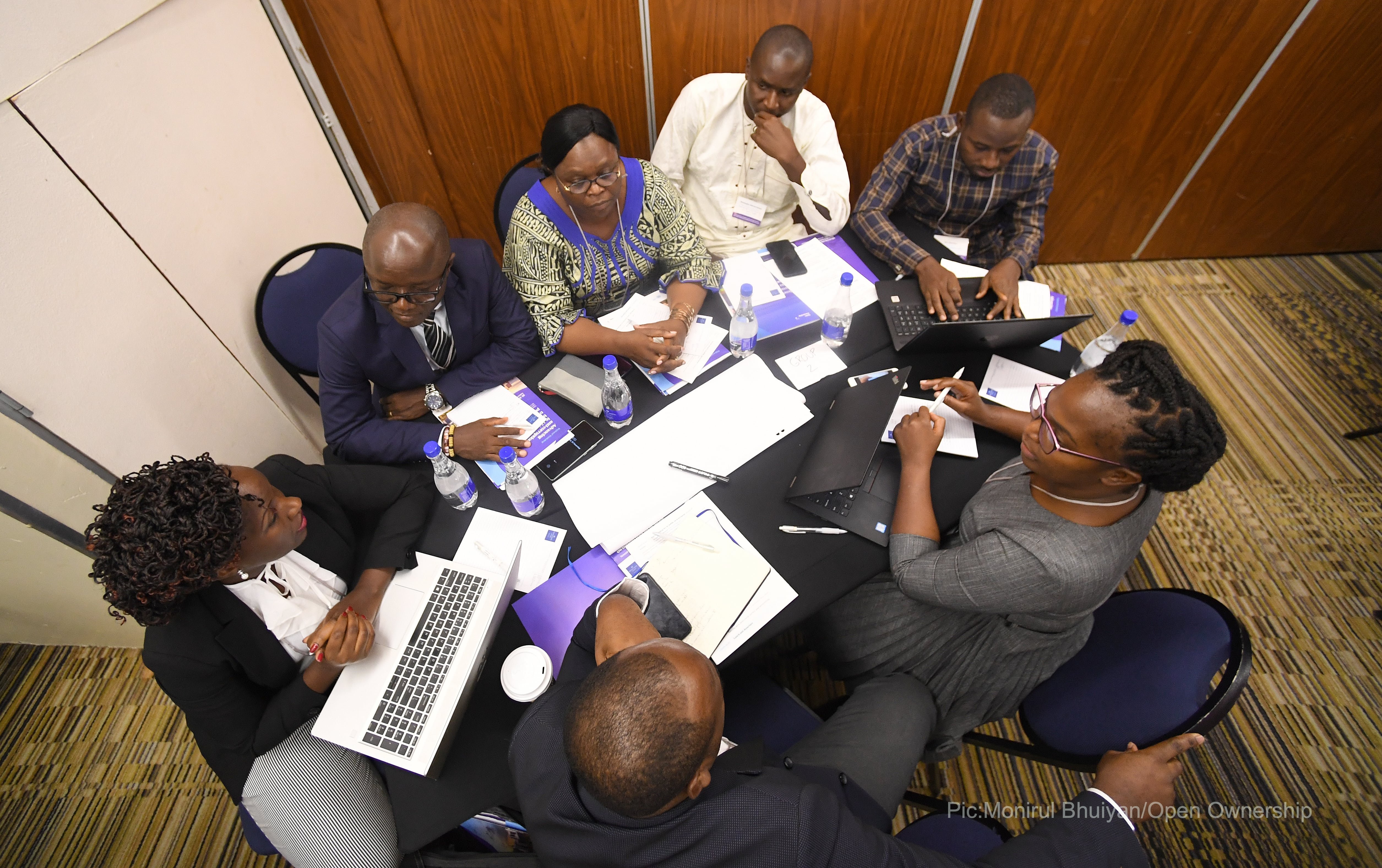
Participant discussions during the workshop. Photo: Monirul Bhuiyan/Open Ownership
The three-day event included:
- presentations of a toolkit developed by UNODC to help link the scrutiny of politically exposed persons (PEPs) and information on beneficial ownership in Southern Africa;
- expert contributions from Open Ownership and Open Contracting Partnership;
- panel discussions featuring a diversity of experience from government agencies from Ghana, Kenya, Malawi, Nigeria, Uganda and the Seychelles; and
- many group discussions to foster exchanges around challenges and good practice to boost the implementation of effective reforms on the continent.
Knowing that 70% of grand corruption cases from recent decades involved anonymously-owned companies, it was no surprise to hear participants from different countries sharing stories of public officials registering companies in foreign jurisdictions in order to hide their identity and bypass competitive tendering to win government contracts. To match the nature and scale of this issue, government representatives and technical experts stressed the importance of inter-agency and international cooperation, supported by solid principles and tools to collect, publish, access and use quality data on both public contracting and beneficial ownership, as well as on PEPs.
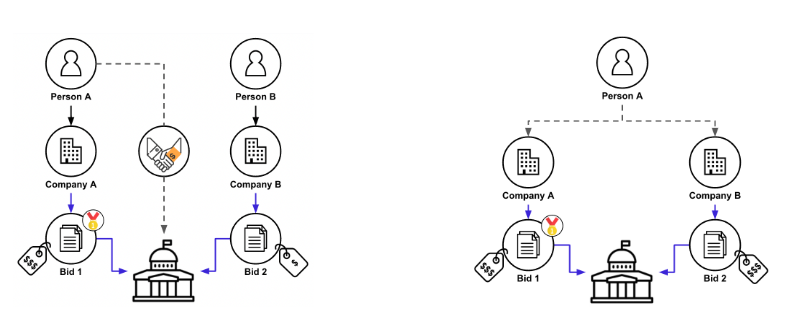
BOT helps uncover hidden ownership and reveal where apparent fair competition is tricked to only benefits the one same person (left), or bypassed to favour someone with links to positions of power (above)
Questions around how to verify that data is accurate and up-to-date were very present in the discussions. Some participants in countries where a beneficial ownership (BO) register is in place explained how collaboration between various authorities to link their register to existing national identifiers (e.g. identifying people through their unique tax identification or passport number) helped verify information. Open Ownership provided delegates with guidance on the principles for effective BO disclosure and on effective verification systems.
Participants also reflected on the benefits of structured data, especially as part of digital platforms that centralise information which can then be easily compared. Many standards and tools exist to support these efforts. Open Ownership and Open Contracting Partnership shared information on international data standards that aim to guide those in charge of developing reforms to know what data to collect and how to structure and publish it in a way that makes it easier to use and of greater quality (OCDS for open contracting and BODS for beneficial ownership). Governments using OCDS to collect and publish information on public contracting can include BO information by using the beneficial ownership extension. Representatives from the Open Contracting Partnership presented lessons learnt from five African countries at the forefront of e-procurement reforms.Innovative solutions like Bluetail were demonstrated to show how by combining structured data on beneficial ownership, open contracting and PEPs red flags and conflicts of interest can be identified before a contract is awarded.
This idea of structured and interoperable data particularly resonated with attendees in the convening. In fact, most participants faced challenges in carrying out investigations on alleged wrongdoing by PEPs hiding behind companies registered in foreign jurisdictions. They explained that political interference was an obstacle but mostly that the lack of direct access to information and the administrative burden and length of mutual legal assistance, meant that an agency could sometimes wait for years before getting a piece of information required for their investigation. The very aim of structured and interoperable data is to ease access to quality data by multiple actors. The more countries adopt these standards, the greater the potential for effective international investigations to tackle corruption. Available sources of structured data were discussed including the Open Ownership Register which gathers 23 million BO records from several European countries and will soon include data from additional countries, including Nigeria and France. On the contracting side, the OCP data registry gathers public procurement data from over 50 countries. Both registers allow access and re-use of structured data on beneficial ownership and public contracting.
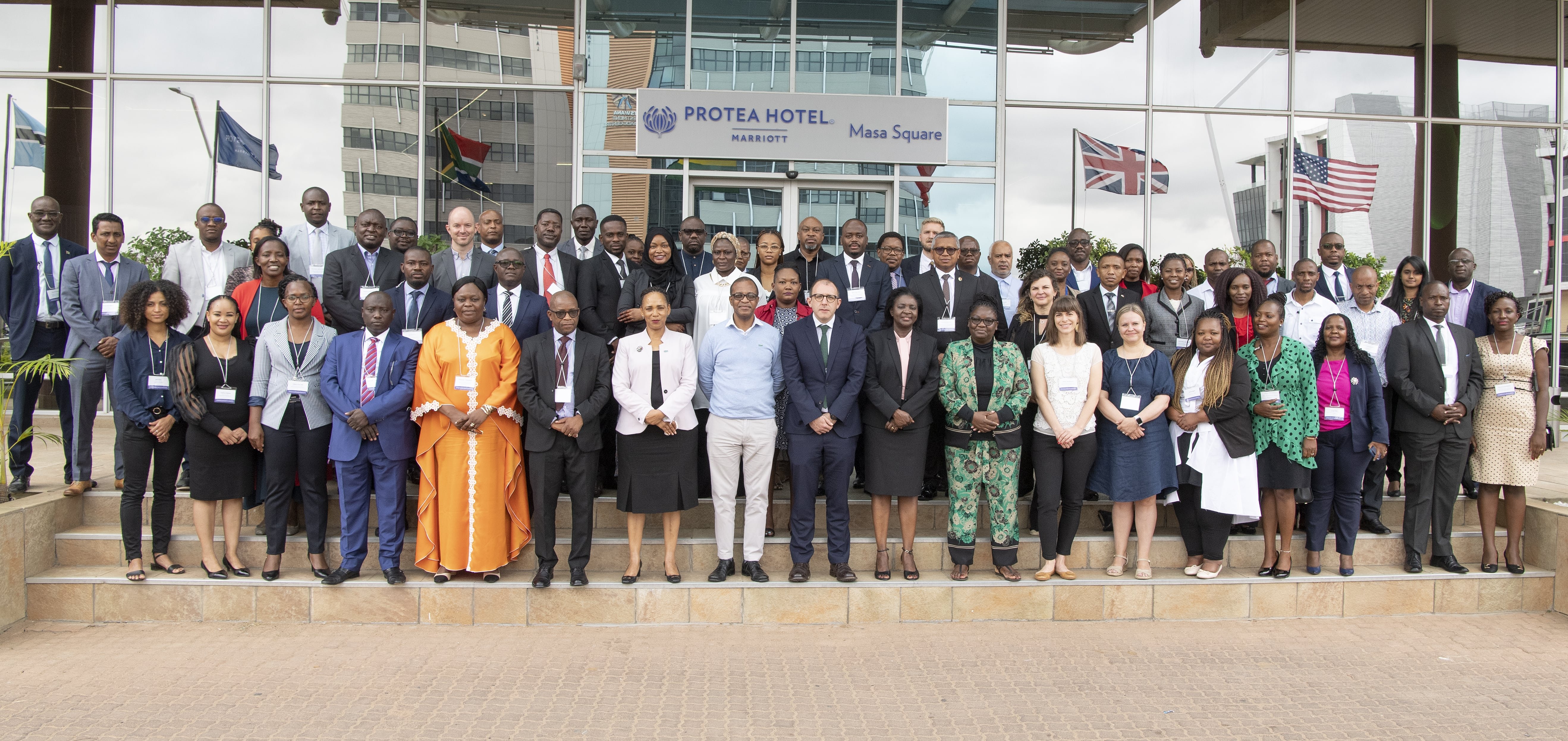
Group photo of all participants and facilitators. Photo: Monirul Bhuiyan/Open Ownership
Connecting experiences to aid effective reforms on BOT in public procurement, and opportunities ahead
The regional workshop aimed to provide space for exchanges around challenges, good practice and solutions. Government agencies greatly appreciated the opportunity for interaction and learning. Participants said that they looked forward to continuing to strengthen their capacity to support the development of effective reforms, and counted on UNODC and the Commonwealth Africa Anti-Corruption Centre to continue to facilitate learning spaces. As noted by a Business Registrar taking part in the event, it was incredibly useful to hear from agencies who need to use BO data to investigate potential corruption cases through public procurement, to identify areas of improvements.
As the gap between commitments to transparency and implementation of reforms is still wide in many countries, Open Ownership in partnership with the UNODC looks forward to continuing to support opportunities for peer exchange, training sessions for law enforcement authorities, documenting BO data users’ experiences, and supporting their needs as well as providing technical expertise to help governments implement effective BOT reforms across Africa and Asia, in countries including Botswana, Indonesia, Madagascar, the Philippines and South Africa, and holding regional workshops in Asia and Latin America.
Related articles and publications
-

Beneficial ownership transparency: Transforming public procurement in South Africa
Published: 23 February 2021
